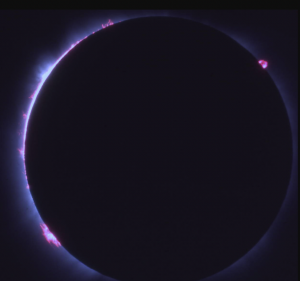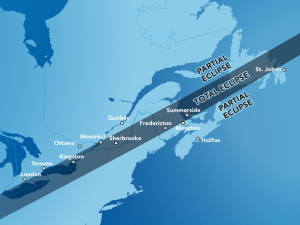On April 8, 2024, the moon will pass in front of the Sun and cast its ethereal shadow onto millions of Canadians. We have one year to prepare for this once-in-a-lifetime total solar eclipse! Now is the time to consider where you will be on April 8, 2024, if you will travel to view the eclipse, and how you will observe the eclipse safely.
In one year, a total solar eclipse will occur over southern Ontario, with a deep partial eclipse visible throughout all of Ontario. This rare astronomical phenomenon occurs when the Moon passes between the Earth and the Sun, and obscures the Sun completely for a short period of time.
This eclipse will be a once-in-a-lifetime opportunity for many Canadians. The last time a total solar eclipse happened over Ontario was in 1979, and another one won’t happen again over this province until 2099!
The path of totality, where the moon will completely block out the sun, will occur in southern Ontario. Kingsville will be one of the most western and earliest points to see the total eclipse, starting around 3:13pm on April 8, 2024 and lasting until about 3:16pm. The path of totality will move north and east through the afternoon as the moon moves, and will be visible in Hamilton, Niagara Falls, and Kingston.
As one of the most eastern points, Cornwall will see totality between 3:25pm and 3:27pm. It will then pass over southern Quebec, New Brunswick, PEI, the northern tip of Nova Scotia, and much of Newfoundland. Ontarians in Toronto and Ottawa will witness a partial eclipse at 99.9% and 98.8% coverage respectively. The coverage of the eclipse visible further north in Ontario will be less, and we recommend Ontarians who can travel to view the eclipse at locations of totality to try and do so. Coverage in Sudbury will be 88.5%, 70.5% in Thunder Bay, 62.3% in Fort Hope, and 55% in Peawanuck.
This event will have an immense impact on you, your community, and all of Eastern and Atlantic Canada. It is important to look ahead and prepare for how and where you will view the eclipse. It is completely safe to observe the eclipse while wearing verified eclipse glasses or using projection methods. If you are in the path of totality – where the Moon will completely block out the Sun – you can take your eclipse glasses off to view the eclipse maximum, or when you can no longer see the Sun through your eclipse glasses.
Over the next year, the Ontario Eclipse Task Force will be working to provide all Ontarians with detailed information about the eclipse, how to view it safely, and events before and on the day of the eclipse. Our task force is composed of members from the University of Toronto, McMaster University, Queen’s University, York University, Brock University, Ontario Tech University, the University of Waterloo, the University of Western Ontario, SNOLAB, the Perimeter Institute, Space Place Canada, the Royal Astronomical Society of Canada (RASC), the Ontario Science Centre, the McDonald Institute, Science North, and Discover the Universe.
What should you do now?
- Think about where you will be on April 8, 2024. Use this Google Map or TimeAndDate to find the exact time of the eclipse in your area. Will you be at work or school? At home? What do you need to organize so you can get outside to view the eclipse? Will you travel to the path of totality? Where in the path?
- If you plan to travel to the path of totality, it is recommended that you arrive at your preferred viewing location 24-48 hours in advance, and stay after the eclipse is completed, to mitigate traffic jams.
How will you view the eclipse safely?
- Consider ordering glasses for yourself, your family, and/or your workplace. Order glasses now through a verified distributor to avoid shortages later.
- If you’re a teacher or educator, sign up for the Discover the Universe Eclipse Newsletter and mailing list. Educational Resources and training opportunities will be shared and offered throughout 2023.
- If you want to help organize an event in your local area or to keep up to date on events for your local area, contact your local RASC chapter or education institution for support or to join their efforts.
_____________________________________________________________________________________________
For more information or questions, please email eclipse@rasc.ca.
For media who want to book an astronomer to talk about this, please contact:
Michael Pereira
Communications and Multimedia Officer
Dunlap Institute for Astronomy & Astrophysics,
University of Toronto
media@dunlap.utoronto.ca


